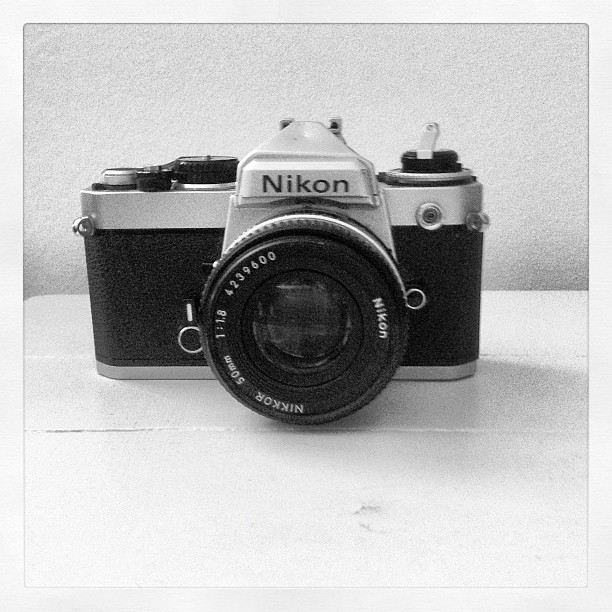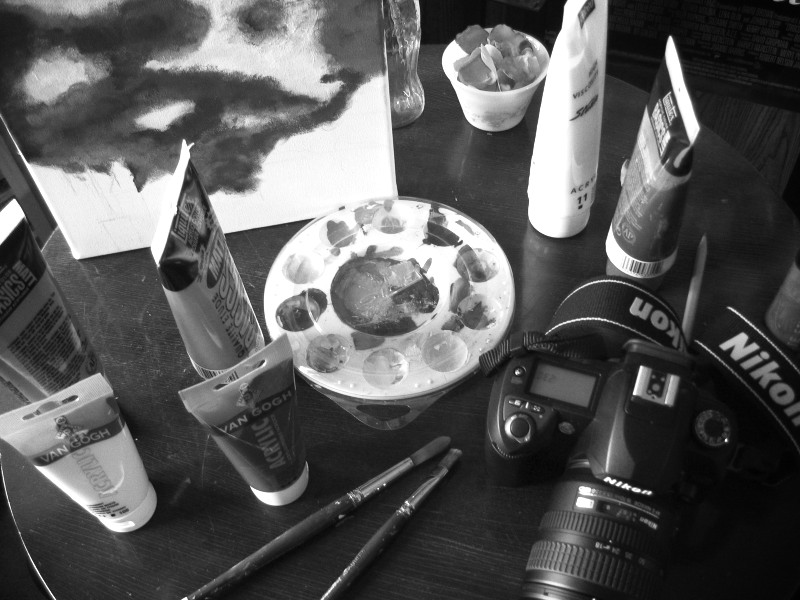I used to think that my “unique” hobbies made me a bit of a special snowflake.
It’s laughable now, but when I was in high school, I was one of the only people I knew who owned a camera. It was a clunky 3-megapixel point-and-shoot that’s of course entirely obsolete today, but I loved that thing like you wouldn’t believe. That Canon A70 and I had a special bond; we understood each other. I was really proud of the fact that I’d bought it with my own money, and even prouder that I also knew how to use Photoshop enough to edit my photos.
I loved taking and editing photos, but I also secretly liked knowing that I had an interest in and an aptitude for something that most people my age didn’t really care much about at the time. I also felt similarly about knowing HTML. Let me tell you, 10-15 years ago, knowing how to code wasn’t at all cool, trendy, or even on most people’s radars (especially, let’s be honest, if you were a girl). So, regardless of how good I actually was, I could feel pretty proud of myself for exploring all of this “uncharted territory” (as I felt it was at the time).
Now, let’s fast forward to today. Not only does almost everyone have a camera in their phone, but apps like Instagram have become ubiquitous. Taking stylized photos is now something that everybody does. Digital SLRs are probably now owned by more new parents and pet owners than by professional photographers. Graphic design, which similarly used to be the domain of a small group of specialists, has also risen to prominence in popular culture in a similar way. In the age of Pantone accessories and Pinterest boards, it’s easy to argue that our culture cares more about design (at least on a very surface level) than ever before.

I took this picture with Instagram. So meta.
So how did I feel when I realized that I wasn’t such a special snowflake anymore? I’ll be honest – I was slightly annoyed at first. Now, the very things that I thought made me unique turned out not to be so unique after all. I had to examine my relationship with my skills and interests to see what I really wanted to get out of them. In time, I’ve come to realize a couple of things:
- When you’re genuinely into something, it shouldn’t really matter how many other people share your interest. It’s kind of like when someone obnoxiously stops listening to a band they claimed to love the instant that band becomes popular. I mean, really. Did they ever actually like the music? The same goes for a niche interest that suddenly explodes. If you truly like what you’re doing, popularity or lack thereof shouldn’t make a huge difference. It will probably make some difference, honestly, but if it totally puts you off, maybe it’s a sign that you weren’t so into it in the first place.
- Now that your formerly obscure pastime has been taken over by just about everybody, just showing up isn’t enough. Now, you actually have to be good to be recognized as an expert (or, really, as someone who’s even proficient) in your field. Feeling like an expert requires a lot more effort than it used to, especially when you have a whole Internet of people to compare yourself to. This can be both motivating and overwhelming. On good days, I settle on realizing that I’ll likely never be the best person in the world at anything, but letting all the talented people in the world motivate me to do better and better.
Interests, pastimes, and professions are a lot deeper than they first appear. Most people, myself obviously included, do things for a variety of reasons. We don’t just choose our hobbies for how they make us feel, but also for how they make us look. We don’t live in a vacuum, and a lot of our choices are dictated by how we think we’ll be perceived by others in the context of our culture and peer groups. The bitterness that some people feel when their previously obscure interest becomes popular really highlights this. I’m not judging that bitterness too harshly, since I think it’s a natural (human, imperfect) reaction. This kind of discomfort can actually be really interesting, since it shines light on our motivations, which usually sit, unnoticed, under the surface.

I was a special snowflake in my late teens and early twenties. I was a bit snobby about my hobbies and tastes. today I don’t care anymore, I have both popular and obscure hobbies and preferences. however, I felt quite offended when a guy with whom I went on a few dates proclaimed I have special snowflake syndrome (I’m in mid 20s now). he meant my personality in general and I instantly lost my interest.
It’s hard to keep being a special snowflake with the Internet — no matter who you are or what you do, there are lots of people out there like you! Also, who criticizes someone after just a few dates? Rude!
I know, thanks for the confirmation! :D
I love that about the internet – you can find folks with similar interests no matter how obscure they are. I can rarely find people in my area to talk about those interests.
I used to be a special snowflake! And I know a lot of people around me still have snowflake syndrome. I actually rant about snowflake syndrome a lot, in the context of these snowflakes believing they are such unique snowflakes that they separate themselves so far from other people they can’t stand it. This happens a lot with snowflake syndrome. They’re always really shocked when they realize other people eat food, have their hearts broken, and spend too much time on twitter, too. I see them melting into shapeless drops of water before my eyes.
I smile when I talk about this. I think we all have things that make us unique, but that in itself makes us less unique. We all have different interests and experiences, but we all have the same feelings, too, and there’s something awesome in that. My best friend is the complete opposite of me. We have very few of the same interests. And yet, we talk on the phone for hours and hours–because we talk about our feelings, heh.
Anyhow! I was really into HTML 10-15 years ago, too! And I helped build a dark room in my friends spare bathroom. When everyone else started getting on the internet and blogging with premade layouts I was like…. what? THIS IS MY SPACE! YOU’RE DOING IT WRONG! But eventually I let go and adjusted. Things do get weird when your interests become trendy. I always have this initial “Where is my credit for finding it FIRST” ridiculous feeling, but in the end I think it’s really fun to be able to try and talk to other people about my passions and have them know what I’m talking about. Of course, on the flip side, it can be sad when I’m trying to talk about things I’m REALLY passionate abotu, and they know about it now, so they don’t want to listen to me ebcause it’s blase, I guess. But oh, well. Like you said, it’s still my passion, and it’s neat how the social interactions around things change, but my interest in it is only influenced–not changed.
Hi Faith! I think you have a really good point about how we can connect to others on many levels beyond interests. In the end, mutual interests are a good starting point, but they’re definitely not everything when it comes to building a real friendship!
It’s hard to be a snowflake at this day and age. Anyone can become anything, thanks to technology. But I do believe that if you have the talent for some things, then you will stand out in spite of the fact that everybody’s doing it :) I guess what’s important is that we keep doing what we love the most.
Exactly! Nowadays, to be special, you have to be very good at what you’re doing — but maybe being ‘special’ isn’t really all that important anyway if you’re having fun and enjoying what you do.